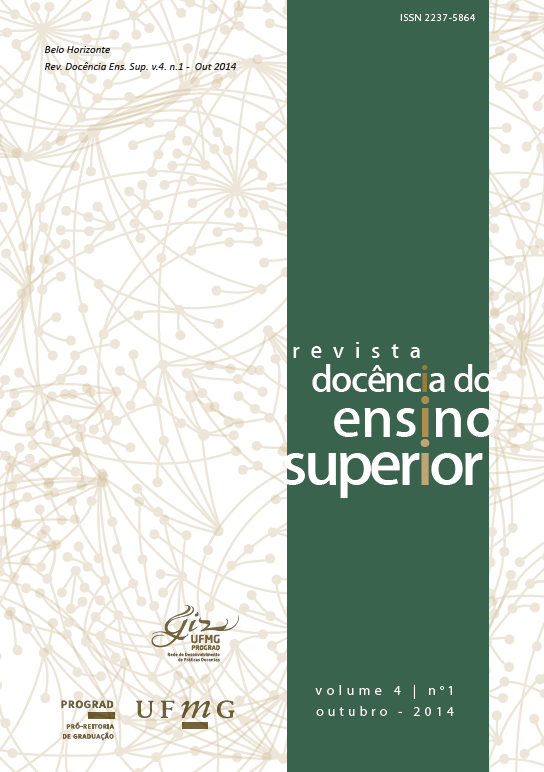As equipes didáticas na UFMG e a formação de docente do ensino superior
DOI:
https://doi.org/10.35699/2237-5864.2014.1986Palavras-chave:
Equipes Didáticas, Expansão do Ensino Superior, Formação de Docentes do Ensino SuperiorResumo
O presente artigo discute o papel das equipes didáticas na formação dos pós-graduandos da UFMG que realizaram o curso de Formação em Docência do Ensino Superior oferecido pelo GIZ – Diretoria de Inovações tecnológicas. Além disso, investiga e relaciona o papel do professor tutor na formação dos pós-graduandos. Foram utilizados dados recolhidos a partir de questionário respondido por esses sujeitos e a conclusão desta analise é que os pós-graduandos que participaram da pesquisa, em geral, consideram a participação em uma equipe didática como importante para sua formação, favorecendo a construção coletiva de conhecimentos e a horizontalidade nas relações professor/orientador e aluno. Consideram, também, que atuar em atividades docentes pode ser dado como um elemento formador positivo e que antecipa situações que ocorrerão em sua trajetória profissional.
Downloads
Downloads
Publicado
Edição
Seção
Licença
Autores que publicam nesta revista mantêm os direitos autorais e concedem à revista o direito de primeira publicação, com o trabalho simultaneamente licenciado sob a Licença Creative Commons Attribution que permite o compartilhamento do trabalho com reconhecimento da autoria e publicação inicial nesta revista.
Autores têm autorização para assumir contratos adicionais separadamente, para distribuição não-exclusiva da versão do trabalho publicada nesta revista (ex.: publicar em repositório institucional ou como capítulo de livro), com reconhecimento de autoria e publicação inicial nesta revista.
Política de acesso aberto:
A Revista Docência do Ensino Superior é um periódico de Acesso Aberto, o que significa que todo o conteúdo está disponível gratuitamente, sem custo para o usuário ou sua instituição. Os usuários podem ler, baixar, copiar, distribuir, imprimir, pesquisar ou vincular os textos completos dos artigos, ou usá-los para qualquer outra finalidade legal, sem solicitar permissão prévia do editor ou do autor, desde que respeitem a licença de uso do Creative Commons utilizada pelo periódico. Esta definição de acesso aberto está de acordo com a Iniciativa de Acesso Aberto de Budapeste (BOAI).



























